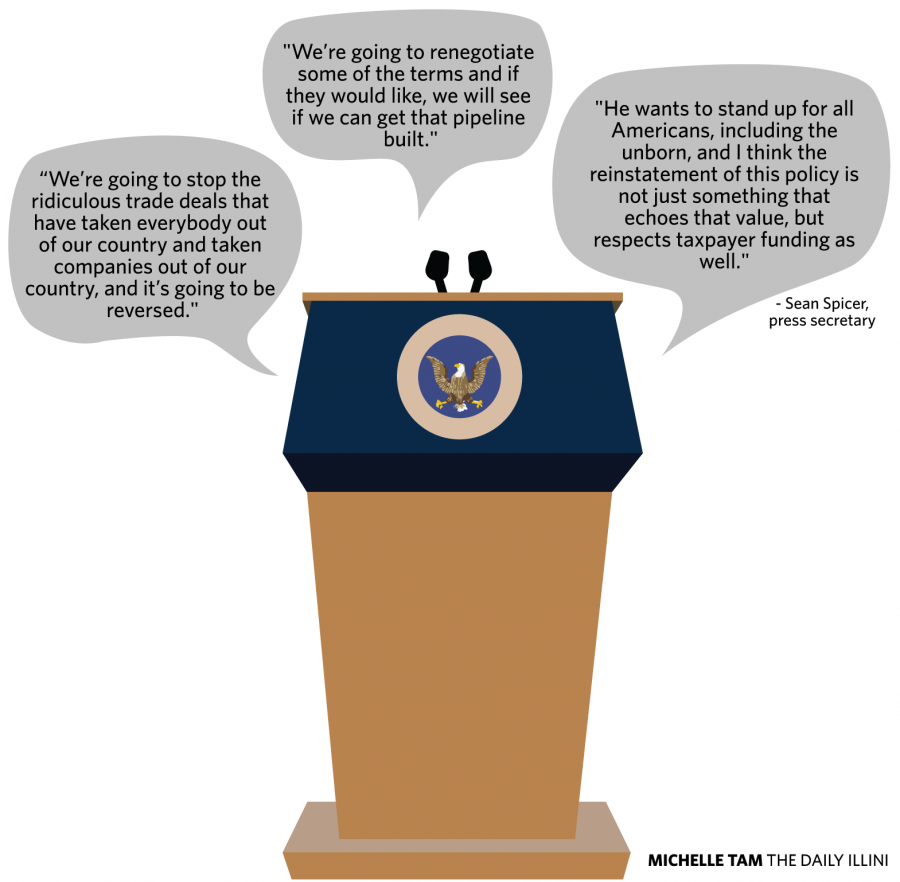Sensationalist articles distract from Trump’s policy decisions
Jan 26, 2017

With a quick scroll through the “news app” on my phone, I can confirm that nearly every article featured at the top of the feed is related to Donald Trump.
The articles range from Trump’s controversial statements on any given day, to his most shared tweets and even complaints from protesters demonstrating against Trump.
The job of the journalist, as a “watchdog,” has always been to inform the public of situations that entail corruption of those in power. Keeping the public informed is a basis of democracy that allows transparency in the actions of those in power, which imposes a level of scrutiny that restricts the amount of power that they can wield.
The Trump administration, namely Press Secretary Sean Spicer, is revolutionary in the way it is able to manipulate the press into doing its bidding, rather than the other way around. Strategically, it can put out controversial statements that get the press printing headlines and the public talking about Trump.
Get The Daily Illini in your inbox!
Years ago, many critics would’ve predicted that this tactic would never have worked. There’s a certain point of extremity that the public can no longer accept, a point in which Trump is put in such a negative light that he begins to lose support.
Instead, the very opposite happened. More headlines generated boosts of support and voters that brought Trump the election.
As many voters continue to question how this outcome occurred, we continue to miss the greater picture. The Trump administration has found its way to manipulate the media to “advertise” Trump, even through negative publicity.
The Trump administration has repeatedly criticized media coverage. Sean Spicer claimed that the journalists are “demoralizing” because he believes all stories regarding Trump are approached from a negative narrative. Trump promised to “open up libel laws” so that he can sue publications for money when they write articles that depict him in a negative light.
The administration’s contemptuous attitude toward the media allows it to take up such manipulative strategies.
The ubiquitous prominence of Trump in every newspaper, social media platform and various online publications spreads his name and garners more and more interest that leads to support from those who would otherwise be oblivious.
Disregarding my personal stance on Trump and his policies or ideals, I think that as an American, there is a significant amount of danger involved with a government that holds so much influence over one of its main checks of power.
Because of this, journalists and readers become caught in a dilemma — how do we provide and consume information about the nature of our government without being caught in the manipulative control of their tactics?
One response may be to move past the sensationalist headlines and the blown-up controversies over every trivial move, and instead focus on the important meat of the situation.
Yes, it is important to acknowledge that Trump’s administration lied about the size of the inaugural crowd.
However, focusing too much on this may distract us from seeing the influential decisions that the administration is making that may actually impact our lives.
For example, I’m sure far fewer people are aware of Trump’s decision to withdraw from the Trans-Pacific Partnership, or his decision to implement Mike Pompeo, a prominent tea party member, as CIA director.
This sensationalist behavior is easy to see — the “most popular” story on the online publication “Slate” as of Tuesday is headlined, “A Detailed Forensic Analysis of Melania Trump’s Creepy, Devastating Inauguration Smile/Frown.”
As consumers of information, we need to be smart in the type of news we’re engaging with and sharing. After all, the readers hold even more power over the press by dictating which articles get more “clicks” and “shares,” which directs publications to write on more topics that bring revenue to their websites.
This is a period in which the presence of the media, and the way the media approaches news is more crucial than ever. With fragmentation in the political spectrum and distrust in the government, the media is the link that communicates information between the people and its governing body.
I may be hypocritical in engaging with the very situation I’m criticizing — urging Americans to get over their obsession with Trump’s antics — but I am hopeful that this shift in approaching stories and a change in the mindset of the public will allow for more respect for the media.
Minju is a sophomore in Media.
[email protected]






